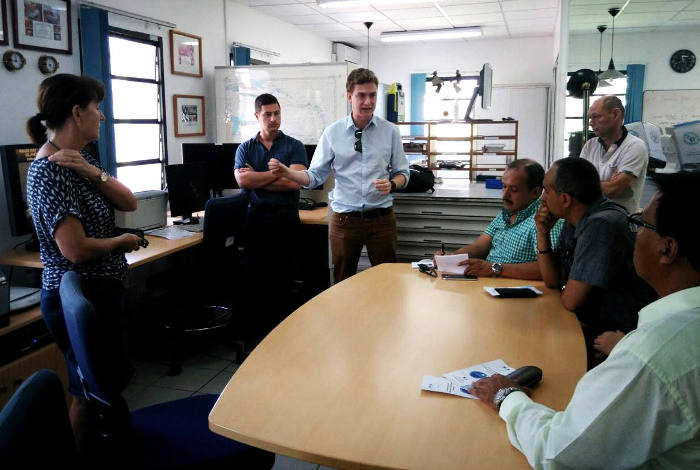-
09 June 2017
Category : Interview
FIIAPP EXPATRIATES: Gerard Muñoz
We dedicate a new space to our protagonists in the field. This time we interview a colleague who has been in Peru for several years.

We’re putting the spotlight back on the work being done in the field, and this time we’re interviewing Gerard Muñoz, the coordinator of the project on fighting organised crime and drug trafficking in Peru.
Gerard has been in the country for three years working to improve the capacities of the Peruvian state in criminal and financial intelligence and anti-drug police operations in ports, airports and jungle areas.
This is not the first time he has worked as an expatriate; he did so years ago in Brazil, but this experience is very different to the last one. We let him tell us about it:
Gerard, how has your adaptation to the country been?
Very positive and everything has been a learning experience. When you arrive you have to adapt yourself to the Andean character; the institutional idiosyncrasies, the way of working, the time factors, the chaos in the city, etc. Once you understand all these local codes, you start to develop a greater capacity for understanding, which becomes evident in the results of your work and also on a personal level. It’s all an exercise in social and cultural anthropology.
You have to adapt to local customs. In fact, when we undertake activities in some eminently indigenous zones like Ayacucho or the VRAEM, where Spanish isn’t even the majority language and the state has hardly any presence, you have to be especially flexible with the customs and needs of the beneficiaries.
It cannot be forgotten that this country experienced an internal crisis between 1980 and 2000 that claimed more than 70,000 victims and that there are still active vestiges of the Sendero Luminoso guerrilla movement. That, together with the high levels of citizen insecurity, means that great mistrust exists amongst the population. You have to know how to behave in different environments and adapt to them to avoid committing blunders.
What has been the most difficult thing for you? And the least?
One of the things that can be most testing is getting used to the chaos of a city like Lima, which has more than 10 million inhabitants and is one of the most polluted on the planet. To explain, traffic is infernal and getting from one place to another can take over two hours.
Likewise, there is always the issue of insecurity. You can’t live obsessed with it, but it ends up affecting your freedom of movement, particularly at night. Although once you accept the chaos as normal, you can live pretty normally and when I go back to Europe I even miss it a little.
The thing that was easiest for me is the work dynamic and the adaptation to my colleagues.
Tell us about your work and your day-to-day life.
The truth is that at work every day is a surprise. The office I coordinate, with eight people in total, is one of the largest FIIAPP has in the field, and naturally absolutely every sort of thing happens to us. Sometimes magic realism falls very short of the mark.
There are days when I have to accompany training or technical assistance activities, do the work of institutional representation or prepare reports for the EU. In the end it’s a question of solving problems, often creatively, and driving the project from the technical, institutional and management standpoint.
Regarding my day-to-day life, traffic restricts your movement and it’s not possible go many places during the week. But I live in a zone where you can do sports, and I appreciate that greatly. At the weekend, it’s another story and you can take advantage of a wider offer of cultural and night-time leisure activities.
How is your relationship with the main office in Madrid? And with your colleagues in Lima?
My relationship with them is practically on a daily basis. The truth is that I’m very grateful for the support I get from the Security and Justice area, which I’ve been a part of for years. In reality, they are my umbilical cord to home.
In Lima, I would call them family members over colleagues, with all the sympathies and antipathies which they imply. In these types of projects, with the issues we deal with, you experience certain situations which form very close bonds.
How would you assess the experience of working as a FIIAPP expatriate in Peru?
Personally, I’m very happy. Although it’s not the same as at first, I’m still surprised by those little things that seem right out of the novel “Captain Pantoja and the Special Service”, by Peruvian writer Mario Vargas Llosa; very far from the reality that we live in Europe.
The views and opinions expressed in this blog are the sole responsibility of the person who write them.




